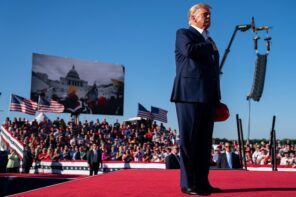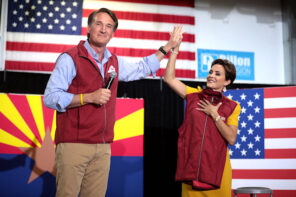At some point in the past week or so, the health care debate stopped being about health care. Sure, how to reform the health care system – if at all – is what everyone notionally keeps talking about. But you don’t have to listen long to get the distinct feeling that deductibles and co-pays, cost containment and preventative care, government mandates and end-of-life decisions have started to function as a collective cipher through which at least one part of America – a largely white, largely Christian, very angry part – is really talking (and often shouting) about something else entirely.
In Hillsboro, Mo., not too far from where I grew up in the evangelical heart of the Ozark foothills, a furious crowd packed Democratic Sen. Claire McCaskill’s town-hall forum on health care earlier this week in order to shout her down practically before she even started speaking. When she asked what the crowd wanted from her if they didn’t want to hear her out on health care, people yelled: “go home.” At a health care town hall in Pennsylvania, one particularly angry man concluded a red-faced harangue of that state’s Republican-turned-Democratic Senator, Arlen Specter, by declaring that Specter would have to stand before God and be judged for his involvement in health care reform. The crowd cheered.
This is not a public discussion, certainly not civil discourse. Indeed, it resembles nothing so much as an uprising among a post-modern Bible Belt whose buckle has come undone. But an uprising against what, exactly?
As Matthew Avery Sutton’s recent post about apocalypticism and the president shows, there are plenty of reasons to think health care reform for many fundamentalist and conservative evangelicals may well be just the latest, most visible evidence that Obama is antichrist. For others, as Frank Schaeffer suggested in another recent piece, opposing health care reform participates in a generations-long effort among evangelicals to aggrandize political power to themselves by obstructing democracy.
More broadly, these examples of religious extremism exist on a continuum of disturbing responses among many evangelicals and others on the far right to Barack Obama’s election to the presidency, and of large progressive majorities in Congress.
Just this week, the Southern Poverty Law Center reported that militia and other paramilitary group formation is on the rise, eerily echoing the kind of activity that preceded the run-up to the Oklahoma City bombing. It’s a chilling report, one suggesting that – without a step away from the brink – we may well look back at incidents such as the murder of George Tiller and the shootings at the Holocaust museum and see the beginnings of a resurgent vigilantism among religious extremists during the age of Obama.
What’s this got to do with the health care debate?
For starters, there’s the guy in New Hampshire who brought a gun (and a sign about watering the tree of democracy with blood from time to time) to a protest outside a recent presidential forum on health care. Interviewing the guy later on Hardball, Chris Matthews was baffled by this, but it makes a certain, scary sense to me.
Having spent a lifetime immersed in the fundamentalist evangelical culture of rural America (first as a Southern Baptist, later as a scholar of religious culture), I’m convinced that all the sound and fury generated by the health care debate is not about health care at all, but about a segment of white, Christian America finding in the health care controversy a sufficiently capacious political occasion to give expression to an intense but incoherent feeling of being displaced from the seat of cultural dominance.
It’s the same feeling of helpless rage animating the revival of the militia movement, the same desperate-times-and-desperate-measures ethos motivating protesters to bring side-arms to public policy debates (a conflation of the first and second amendments that led the blogger Josh Marshall to wonder sardonically about a “transitive property of amendments”).
America right now is full of potential energy supplies for all this rage. Take, for instance, this week’s image of a bi-racial American president of Kenyan descendant giving a hearty White House welcome to a wise – and unmarried — Latina recently confirmed to one of the most powerful positions in the country. For many conservative and fundamentalist Christians, these types of images quite literally betoken a forsaking of the nation’s Anglo-centric, patriarchal heritage, and in this view we will – we must – as that Pennsylvania protester put it, be judged.
Another way to put it (borrowing Raymond Williams’s formulation): an emergent culture – the multiethnic, politically progressive, increasingly urban, pluralistic and humanist generation of leaders embodied in Barack Obama – is overtaking the once dominant position so long occupied by Americans of Anglo-European descent and committed to a conservative Christian worldview. This point of view is fast becoming what Williams called a “residual” culture, and history provides scant evidence of anyone quietly surrendering to that particular fate.
In this context, there are few issues as capable as health care of accommodating so many of the conspiracy theories, myths, and figments of the imagination galloping like a virus through the newly disempowered right wing of America. And thus does that once imposing, silent majority become ever more radicalized within a gestalt of grievance, alienation, and increasingly, its own self-induced political irrelevance.




